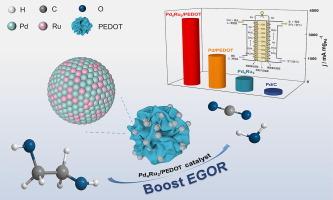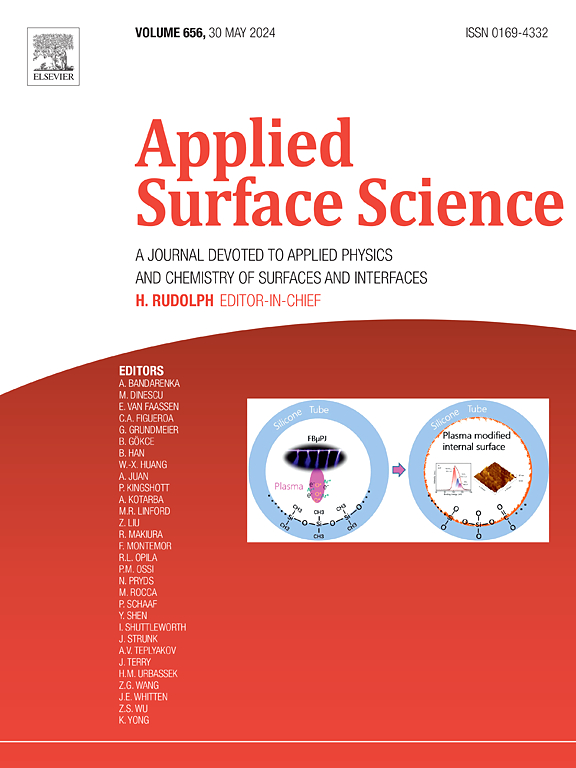Poly(3,4-ethylenedioxythiophene)-supported Pd4Ru2 synergistically promote electrocatalytic oxidation of ethylene glycol
IF 6.3
2区 材料科学
Q2 CHEMISTRY, PHYSICAL
引用次数: 0
Abstract
Direct ethylene glycol fuel cells (DEGFCs) necessitate cost-effective and efficient electrocatalyst toward oxidation of ethylene glycol (EG) to overcome the challenges associated with sluggish anodic oxidation reaction kinetics. Herein, Poly(3,4-ethylenedioxythiophene) (PEDOT) granules support well-dispersed Ru-doped Pd electrocatalysts (PdRu/PEDOT) were synthesized. The optimized Pd4Ru2/PEDOT demonstrates exceptional electrocatalytic performance toward alkaline EG oxidation reaction (EGOR) electrocatalysis, achieving the mass activity of 4141.8 mA mgPd-1. The exceptional catalytic activity stems from the three-dimensional porous structure of Pd4Ru2/PEDOT, which presents abundant active sites and kinetically accelerates electron/reactant transport within its mesoporous architecture. In addition, the results of long-term cyclic voltammetry (CV) and chronoamperometry (CA) tests demonstrate that Pd4Ru2/PEDOT exhibits superior catalytic durability and anti-poisoning capabilities, attributable to the synergistic effect between the electron-rich conjugated structure of PEDOT and the presence of both Pd and Ru. This study offers novel insights into the development of electrocatalysts for DEGFCs.

直接乙二醇燃料电池(DEGFCs)需要经济高效的乙二醇(EG)氧化电催化剂,以克服阳极氧化反应动力学缓慢所带来的挑战。在此,我们合成了聚(3,4-亚乙二氧基噻吩)(PEDOT)颗粒支撑分散良好的掺钌钯电催化剂(PdRu/PEDOT)。优化后的 Pd4Ru2/PEDOT 对碱性 EG 氧化反应(EGOR)电催化具有优异的电催化性能,质量活性达到 4141.8 mA mgPd-1。Pd4Ru2/PEDOT 的三维多孔结构提供了丰富的活性位点,并在其介孔结构中加速了电子/反应物的传输,因而具有优异的催化活性。此外,长期循环伏安法(CV)和精密量热法(CA)测试结果表明,Pd4Ru2/PEDOT 具有卓越的催化耐久性和抗中毒能力,这归功于 PEDOT 的富电子共轭结构与 Pd 和 Ru 的协同效应。这项研究为开发用于 DEGFCs 的电催化剂提供了新的见解。
本文章由计算机程序翻译,如有差异,请以英文原文为准。
求助全文
约1分钟内获得全文
求助全文
来源期刊

Applied Surface Science
工程技术-材料科学:膜
CiteScore
12.50
自引率
7.50%
发文量
3393
审稿时长
67 days
期刊介绍:
Applied Surface Science covers topics contributing to a better understanding of surfaces, interfaces, nanostructures and their applications. The journal is concerned with scientific research on the atomic and molecular level of material properties determined with specific surface analytical techniques and/or computational methods, as well as the processing of such structures.
 求助内容:
求助内容: 应助结果提醒方式:
应助结果提醒方式:


